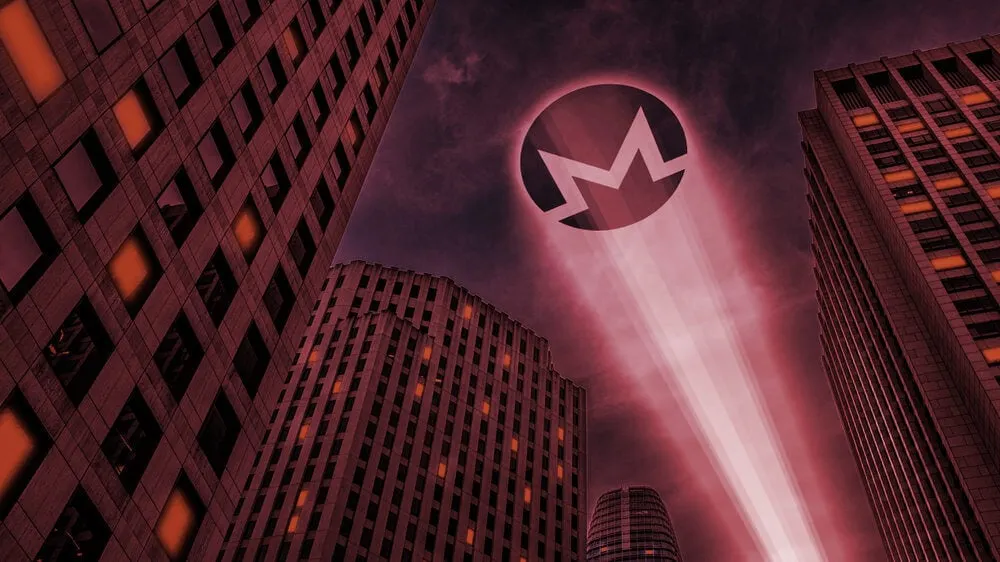Congratulations on a successful network upgrade! 🎉 #Monero is now more private and efficient with ringsize 16, Bulletproofs+, and view tags!
Make sure your node/wallet is updated to continue using Monero.
Privacy and fungibility matter, and it’s exciting to keep improving!
— Monero (XMR) (@monero) August 13, 2022
Coin Prices
BTC
$64,664.00
-4.34%ETH
$1,856.55
-5.00%XRP
$1.35
-2.88%BNB
$596.49
-2.85%USDC
$0.999804
-0.01%SOL
$77.77
-5.95%TRX
$0.281557
-3.06%FIGR_HELOC
$1.031
1.49%DOGE
$0.092589
-3.01%WBT
$48.26
-4.15%BCH
$495.03
-13.22%USDS
$0.999834
-0.02%ADA
$0.262218
-3.38%LEO
$8.04
-1.89%HYPE
$26.31
-9.30%CC
$0.162571
1.22%USDE
$0.998842
-0.02%LINK
$8.26
-4.65%XMR
$307.64
-6.19%XLM
$0.151318
-2.33%USD1
$0.999043
-0.02%RAIN
$0.0093073
-2.82%PYUSD
$0.999646
-0.02%HBAR
$0.094865
-3.34%LTC
$51.28
-4.10%ZEC
$237.41
-2.96%AVAX
$8.36
-5.88%SHIB
$0.00000601
-2.98%SUI
$0.879538
-4.93%TON
$1.34
-0.31%CRO
$0.074403
-1.71%WLFI
$0.10969
-4.36%XAUT
$5,213.80
1.40%M
$1.40
3.58%PAXG
$5,255.10
1.47%UNI
$3.34
-4.20%DOT
$1.26
-3.65%BUIDL
$1.00
0.00%MNT
$0.576309
-4.87%USDF
$0.997299
0.03%AAVE
$114.62
-2.93%ASTER
$0.701775
0.92%PEPE
$0.00000396
-2.14%USDG
$0.99975
-0.03%TAO
$169.84
-1.96%USYC
$1.12
0.00%BGB
$2.24
-1.93%OKB
$74.53
-3.95%RLUSD
$0.99979
0.01%HTX
$0.00000166
-2.62%PI
$0.15986
-2.47%SKY
$0.0629
-2.10%BFUSD
$0.998918
0.03%ETC
$8.35
-1.91%NEAR
$0.979921
-4.08%ONDO
$0.248414
-5.26%USTB
$11.00
0.01%ICP
$2.09
-3.08%GT
$6.82
-4.29%POL
$0.106624
-0.12%KCS
$8.22
-3.83%WLD
$0.372532
-2.90%PUMP
$0.00179282
-11.25%ATOM
$2.12
-5.84%NIGHT
$0.058265
0.34%HASH
$0.01743943
-3.01%QNT
$62.75
-1.98%USDTB
$0.999286
-0.01%NEXO
$0.826867
-4.45%ENA
$0.098401
-1.61%KAS
$0.0296664
-2.37%EUTBL
$1.24
-0.29%FLR
$0.00908139
-1.94%TRUMP
$3.31
-2.48%ALGO
$0.083879
-3.36%USDD
$0.998922
-0.09%PIPPIN
$0.737971
18.53%OUSG
$114.39
0.02%JAAA
$1.027
0.04%RENDER
$1.38
-2.54%USDY
$1.11
-0.00%XDC
$0.03368155
-2.76%FIL
$0.890463
-4.12%APT
$0.810407
-3.59%VET
$0.00732003
-1.82%BDX
$0.080313
0.16%JTRSY
$1.095
0.03%USD0
$0.996944
-0.11%MORPHO
$1.57
-1.86%ARB
$0.093631
-1.02%GHO
$0.999641
0.01%BONK
$0.00000586
-4.02%STABLE
$0.0285684
-3.70%A7A5
$0.0130037
0.47%TUSD
$0.999309
-0.06%JUP
$0.145512
-3.54%FTN
$1.087
-0.02%USDAI
$0.999541
-0.02%EURC
$1.18
-0.28%DCR
$26.44
5.24%SEI
$0.066663
-3.26%KITE
$0.24129
-5.76%STX
$0.23631
-3.40%DASH
$31.93
-3.74%CAKE
$1.22
-5.59%JST
$0.04549587
5.67%KAU
$167.98
0.59%XTZ
$0.368815
-2.71%PENGU
$0.006315
-4.06%FDUSD
$0.998407
-0.03%VIRTUAL
$0.590222
-5.56%IP
$1.018
-4.97%CHZ
$0.03388077
-2.84%FET
$0.153753
-3.49%LIT
$1.39
-4.15%CTM
$0.078579
-4.77%PRIME
$1.02
-0.07%ETHFI
$0.452329
1.54%USX
$0.999578
-0.01%INJ
$3.32
-5.67%NFT
$0.00000033
0.12%CRV
$0.222013
-4.35%BTT
$0.00000033
-1.46%SUN
$0.0165396
-2.75%GNO
$118.35
-2.44%KAIA
$0.053284
-3.74%ADI
$3.15
-3.02%ZRO
$1.49
-7.54%BSV
$15.11
-3.74%PYTH
$0.05057
-2.84%CRVUSD
$0.998134
0.12%IOTA
$0.066231
-2.68%JASMY
$0.00568832
1.03%GRT
$0.02603508
-2.56%FRAX
$0.991332
-0.27%AERO
$0.296755
-6.21%FLOKI
$0.00002806
-3.77%TIA
$0.299629
-3.95%OHM
$16.80
-3.00%BTSE
$1.62
0.87%HNT
$1.40
-3.80%OP
$0.121794
-0.53%LDO
$0.298516
-3.00%SPX
$0.271553
-10.92%CFX
$0.04823247
-5.29%H
$0.135439
-16.98%AB
$0.00247714
1.29%TEL
$0.00255126
-5.72%SYRUP
$0.206517
-6.61%2Z
$0.067846
-3.20%ENS
$6.06
-4.08%NUSD
$1.00
0.18%MON
$0.02053969
3.39%STRK
$0.04040176
-7.01%YLDS
$0.999993
-0.00%USTBL
$1.075
0.03%USDA
$0.983924
0.02%AUSD
$0.999446
-0.04%SIREN
$0.2913
8.40%SAND
$0.078653
-3.45%UDS
$1.68
2.55%AXS
$1.23
-5.68%BCAP
$22.79
-0.31%TWT
$0.49752
-3.85%APEPE
$0.00000096
0.17%WIF
$0.200295
-5.18%ULTIMA
$5,251.42
-3.65%ZBCN
$0.00201282
-3.80%PENDLE
$1.19
-1.01%LUNC
$0.00003481
-1.72%PC0000031
$1.00
0.00%XPL
$0.086979
-2.91%THETA
$0.187539
-2.63%NEO
$2.66
-0.75%VSN
$0.051754
-3.51%ZK
$0.01991429
4.21%BORG
$0.185331
-4.35%FF
$0.077187
-2.12%FDIT
$1.00
0.00%XCN
$0.00477982
-2.97%SENT
$0.02441615
13.66%MANA
$0.091163
-3.65%BAT
$0.11649
-0.78%RIVER
$8.76
9.40%BARD
$0.759316
-3.88%IUSD
$0.999549
-0.06%WFI
$2.08
-4.59%COMP
$17.24
-2.02%GALA
$0.00350756
-3.53%VVV
$3.75
-2.46%9BIT
$0.02008491
-3.30%MX
$1.79
2.88%CVX
$1.78
-6.46%KOGE
$47.98
-0.00%SATUSD
$0.992817
-0.16%REAL
$0.050487
-4.58%TIBBIR
$0.157113
-5.50%EURS
$1.26
-0.28%FLUID
$1.97
-6.01%GLM
$0.15322
-5.96%RAY
$0.568913
-7.98%USDF
$0.997902
-0.05%S
$0.03967657
-3.59%XEC
$0.0000075
-3.37%THBILL
$1.014
-0.04%GUSD
$0.999302
-0.23%FARTCOIN
$0.144895
-17.17%WEMIX
$0.310064
-0.59%TRAC
$0.316685
-3.63%MWC
$12.71
-8.33%RUNE
$0.385864
-4.06%DEXE
$2.89
11.43%ZANO
$8.89
2.23%B
$0.133958
1.37%0G
$0.625625
-2.63%IMX
$0.155886
-2.57%ACRED
$1,096.61
-0.05%SFP
$0.258447
-0.08%GOMINING
$0.318809
-1.67%SNX
$0.37345
-13.25%BAN
$0.127522
-1.16%A
$0.078407
-2.04%RLB
$0.072824
-5.86%EGLD
$4.32
-2.91%DOLA
$0.99501
-0.05%COCO
$0.125689
-0.07%COW
$0.22212
-0.57%1INCH
$0.08827
-3.40%OZO
$0.12996
-0.62%AMP
$0.00144758
-3.48%JTO
$0.277298
-8.34%AR
$1.86
-5.92%KTA
$0.243073
-5.01%PUSD
$1.001
0.57%CUSD
$1.009
2.83%WAL
$0.073661
-3.93%CASH
$0.999509
-0.02%LION
$0.00384322
-3.14%BERA
$0.5483
-5.84%MYX
$0.613232
-30.83%BMX
$0.338308
-1.04%FRXUSD
$0.999629
-0.09%REUSD
$1.062
0.08%QRL
$1.42
5.67%EIGEN
$0.184722
2.35%AVUSD
$0.994694
-0.47%LPT
$2.20
-3.00%DUSD
$0.998929
-0.00%
